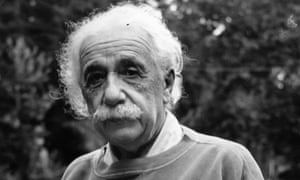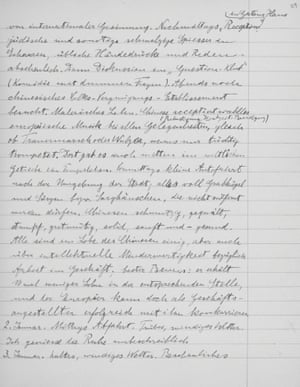Einstein's travel diaries reveal 'shocking' xenophobia
Private journals kept by the scientist and humanitarian icon show prejudiced attitudes towards the people he met while travelling in Asia
The publication of Albert Einstein’s private diaries detailing his tour of Asia in the 1920s reveals the theoretical physicist and humanitarian icon’s racist attitudes to the people he met on his travels, particularly the Chinese.
Written between October 1922 and March 1923, the diaries see the scientist musing on his travels, science, philosophy and art. In China, the man who famously once described racism as “a disease of white people” describes the “industrious, filthy, obtuse people” he observes. He notes how the “Chinese don’t sit on benches while eating but squat like Europeans do when they relieve themselves out in the leafy woods. All this occurs quietly and demurely. Even the children are spiritless and look obtuse.” After earlier writing of the “abundance of offspring” and the “fecundity” of the Chinese, he goes on to say: “It would be a pity if these Chinese supplant all other races. For the likes of us the mere thought is unspeakably dreary.”
Ze’ev Rosenkranz, senior editor and assistant director of the Einstein Papers Project at the California Institute of Technology, said: “I think a lot of comments strike us as pretty unpleasant – what he says about the Chinese in particular.
“They’re kind of in contrast to the public image of the great humanitarian icon. I think it’s quite a shock to read those and contrast them with his more public statements. They’re more off guard, he didn’t intend them for publication.”
Rosenkranz has edited and translated The Travel Diaries of Albert Einstein, which have just been published for the first time as a standalone volume by Princeton University Press, including facsimiles of the diary pages. The diaries have only previously been published in German as part of the 15-volume Collected Papers of Albert Einstein, with small supplementary translations into English. A spokesperson for Princeton University Press said: “This is the first time Einstein’s travel diary will be made available to anyone who isn’t a serious Einstein scholar.”
Further passages in the diaries, which are thought to have been written for Einstein’s stepdaughters in Berlin while he and his wife were travelling in Asia, Spain and Palestine, and as an aide memoire, see him writing of the Chinese that “even those reduced to working like horses never give the impression of conscious suffering. A peculiar herd-like nation [ … ] often more like automatons than people.” He later adds, in Rosenkranz’s words, “a healthy dose of extreme misogyny” to his xenophobia with the observation: “I noticed how little difference there is between men and women; I don’t understand what kind of fatal attraction Chinese women possess which enthrals the corresponding men to such an extent that they are incapable of defending themselves against the formidable blessing of offspring”.
In Colombo in Ceylon, Einstein writes of how the locals “live in great filth and considerable stench at ground level” adding that they “do little, and need little. The simple economic cycle of life.”
Einstein’s perceptions of the Japanese he meets are, in contrast, more positive: “Japanese unostentatious, decent, altogether very appealing,” he writes. “Pure souls as nowhere else among people. One has to love and admire this country.” But Rosenkranz points out that he also concludes that the “intellectual needs of this nation seem to be weaker than their artistic ones – natural disposition?”
“Einstein’s diary entries on the biological origin of the alleged intellectual inferiority of the Japanese, Chinese, and Indians are definitely not understated and can be viewed as racist – in these instances, other peoples are portrayed as being biologically inferior, a clear hallmark of racism. The disquieting comment that the Chinese may ‘supplant all other races’ is also most revealing in this regard,” writes Rosenkranz.
“Here, Einstein perceives a foreign ‘race’ as a threat, which … is one of the characteristics of a racist ideology. Yet the remark that must strike the modern reader as most offensive is his feigning not to understand how Chinese men can find their women sufficiently attractive to have offspring with them. In light of these instances, we must conclude that Einstein did make quite a few racist and dehumanising comments in the diary, some of which were extremely unpleasant.”
Rosenkranz told the Guardian that although views like Einstein’s were prevalent at the time, they were not universal. “That’s usually the reaction I get – ‘we have to understand, he was of the zeitgeist, part of the time’ – but I think I tried here and there to give a broader context. There were other views out there, more tolerant views,” he said.
In his introduction, Rosenkranz writes how it is important to explore how a humanist icon such as Einstein – whose image was once used for a UNHCR campaign with the slogan “A bundle of belongings isn’t the only thing a refugee brings to his new country. Einstein was a refugee” – could have written xenophobic comments about the peoples he encountered.
“The answer to this question seems very relevant in today’s world, in which the hatred of the other is so rampant in so many places around the world,” he writes. “It seems that even Einstein sometimes had a very hard time recognising himself in the face of the other.”
Since you’re here…
… we have a small favour to ask. More people are reading the Guardian than ever but advertising revenues across the media are falling fast. And unlike many news organisations, we haven’t put up a paywall. By making our journalism publicly available, we're able to hold governments, companies and institutions to account, and offer our diverse readership a platform for debate and commentary – encouraging us all to challenge our opinions on what’s happening in our world.
The Guardian’s independent, investigative journalism takes a lot of time, money and hard work to produce. But we do it because we believe our perspective matters – because it might well be your perspective, too.
The Guardian’s independent, investigative journalism takes a lot of time, money and hard work to produce. But we do it because we believe our perspective matters – because it might well be your perspective, too.
I appreciate there not being a paywall: it is more democratic for the media to be available for all and not a commodity to be purchased by a few. I’m happy to make a contribution so others with less means still have access to information.Thomasine, Sweden https://www.theguardian.com/books/2018/jun/12/einsteins-travel-diaries-reveal-shocking-xenophobia?CMP=share_btn_twManuscritos
Los diarios de viaje de Einstein revelan xenofobia "chocante"
Los diarios privados guardados por el científico y el ícono humanitario muestran actitudes prejuiciosas hacia las personas que conoció cuando viajaba por Asia.
Alison Flood
Mar 12 jun 2018 17.32 BST Última modificación el miércoles 13 de junio de 2018 16.33 BST
Comparte
16,150
Albert Einstein en 1921.
Cara desconocida de un ícono ... Albert Einstein en 1921. Fotografía: Doreen Spooner / Getty Images
La publicación de los diarios privados de Albert Einstein que detallan su gira por Asia en la década de 1920 revela las actitudes racistas del físico teórico y del ícono humanitario hacia las personas que conoció en sus viajes, particularmente los chinos.
Escrito entre octubre de 1922 y marzo de 1923, los diarios ven al científico reflexionar sobre sus viajes, ciencia, filosofía y arte. En China, el hombre que una vez describió el racismo como "una enfermedad de los blancos" describe a la "gente trabajadora, asquerosa y obtusa" que observa. Señala cómo "los chinos no se sientan en bancos mientras comen, sino que se ponen en cuclillas como hacen los europeos cuando hacen sus necesidades en los frondosos bosques. Todo esto ocurre en silencio y recatado. Incluso los niños no tienen espíritu y parecen obtusos ". Después de escribir sobre la" abundancia de hijos "y la" fecundidad "de los chinos, continúa diciendo:" Sería una pena que estos chinos suplantasen a todas las demás razas. Para gente como nosotros, el mero pensamiento es indescriptiblemente lúgubre ".
Ze'ev Rosenkranz, editor principal y asistente del director del Einstein Papers Project en el Instituto de Tecnología de California, dijo: "Creo que muchos comentarios nos parecen bastante desagradables, lo que dice sobre los chinos en particular.
"Están en cierto modo en contraste con la imagen pública del gran icono humanitario. Creo que es un shock leerlos y contrastarlos con sus declaraciones más públicas. Están más desprevenidos, no tenía intención de publicarlos ".
Una página de los diarios de viaje de Albert Einstein escritos en China en 1922. Tomado del libro The Travel Diaries de Albert Einstein (Princeton University Press)
FacebookTwitterPinterest
Una página de los diarios de viajes de Einstein, escrita en China en 1922. Fotografía: con permiso de los Archivos Albert Einstein, la Universidad Hebrea de Jerusalén y la Biblioteca y Museo Morgan.
Rosenkranz ha editado y traducido The Travel Diaries de Albert Einstein, que acaba de publicarse por primera vez como un volumen independiente de Princeton University Press, que incluye facsímiles de las páginas del diario. Los diarios solo han sido publicados previamente en alemán como parte de los 15 Collected Papers de Albert Einstein, con pequeñas traducciones suplementarias al inglés. Un vocero de Princeton University Press dijo: "Esta es la primera vez que el diario de viaje de Einstein estará disponible para cualquiera que no sea un erudito serio de Einstein".
Otros pasajes en los diarios, que se cree que fueron escritos para las hijastras de Einstein en Berlín mientras él y su esposa viajaban por Asia, España y Palestina, y como aide memoire, lo vieron escribiendo a los chinos que "incluso aquellos reducidos a trabajar como caballos nunca da la impresión de sufrimiento consciente. Una nación peculiar parecida a una manada, a menudo más como autómatas que como personas ". Más tarde agrega, en palabras de Rosenkranz," una buena dosis de misoginia extrema "a su xenofobia con la observación:" Noté la poca diferencia que existe entre los hombres ". y mujeres; No entiendo qué clase de atracción fatal poseen las mujeres chinas que embelesa a los hombres correspondientes hasta tal punto que son incapaces de defenderse contra la formidable bendición de la descendencia ".
Anuncio
En Colombo, en Ceilán, Einstein escribe sobre cómo los lugareños "viven en gran inmundicia y un hedor considerable a nivel del suelo", y agrega que "hacen poco y necesitan poco". El simple ciclo económico de la vida ".
Las percepciones de Einstein sobre los japoneses que conoce son, por el contrario, más positivas: "japonés nada ostentoso, decente, del todo muy atractivo", escribe. "Almas puras como en ningún otro lugar entre las personas. Uno tiene que amar y admirar este país ". Pero Rosenkranz señala que él también concluye que" las necesidades intelectuales de esta nación parecen ser más débiles que las de índole artística: ¿disposición natural? "
Regístrese para Marcadores: descubra nuevos libros nuestro correo electrónico semanal
Lee mas
“Diario de notas de Einstein sobre el origen biológico de la supuesta inferioridad intelectual de los japoneses, chinos, indios y definitivamente no son subestimados y pueden ser vistos como racistas - en estos casos, otros pueblos se muestra como un ser biológicamente inferiores, una clara característica del racismo . El inquietante comentario de que los chinos pueden "suplantar a todas las demás razas" también es muy revelador en este sentido ", escribe Rosenkranz.
"Aquí, Einstein percibe una 'raza' extranjera como una amenaza, que ... es una de las características de una ideología racista. Sin embargo, la observación que debe sorprender al lector moderno como la más ofensiva es que él finge no entender cómo los hombres chinos pueden encontrar


No hay comentarios.:
Publicar un comentario